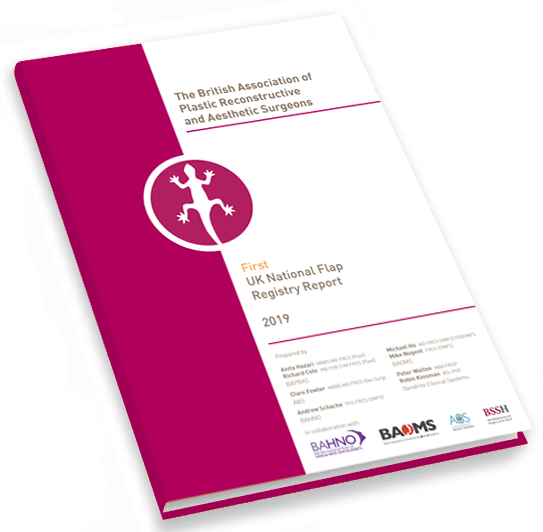 The British Association of Plastic, Reconstructive and Aesthetic Surgeons (BAPRAS), in conjunction with Dendrite Clinical Systems, is delighted to announce the release of the First UK National Flap Registry (UKNFR) Report. The UKNFR, which was launched in August 2015, collects information on all major free and pedicled flap operations carried out in the UK. This cross-specialty registry is supported by the British Association of Head and Neck Oncologists (BAHNO), the British Association of Oral Maxillofacial Surgeons (BAOMS) and the Association of Breast Surgery (ABS) and the British Society for Surgery of the Hand (BSSH).
The British Association of Plastic, Reconstructive and Aesthetic Surgeons (BAPRAS), in conjunction with Dendrite Clinical Systems, is delighted to announce the release of the First UK National Flap Registry (UKNFR) Report. The UKNFR, which was launched in August 2015, collects information on all major free and pedicled flap operations carried out in the UK. This cross-specialty registry is supported by the British Association of Head and Neck Oncologists (BAHNO), the British Association of Oral Maxillofacial Surgeons (BAOMS) and the Association of Breast Surgery (ABS) and the British Society for Surgery of the Hand (BSSH).
“The motivation for individuals across the collaborating specialties has come with a shared belief in the need to verify and improve clinical standards and a desire to breakdown historic specialty barriers. Thank you to surgical colleagues from BAPRAS, BAOMS, BAHNO and ABS who have helped with this report, interpreting the graphs, tables and charts in a manner that is clinically relevant and avoids inherent problems of over interpretation of data,” Miss Anita Hazari, Consultant Plastic Surgeon, UKNFR Audit Lead, writes in the Introduction of the report on behalf of the UKNFR Team. “The UKNFR is the first national registry of its type in the world to collect data on all major pedicled and free flap operations. Data entry is voluntary, and it is acknowledged that unit data in this first report may not be a true representation of the case load of each participating unit. However, this report is the first step in a process that will span years.”
The report includes 5,751 operation records from over 180 registered consultants from 97 private and NHS hospitals in England, Wales, Northern Ireland and Republic of Ireland (surgeons in Scotland are awaiting permission to join this project from the Public Benefit and Privacy Panel (PBPP) for Health and Social Care).
Key findings of the report include:
- The majority of operations were for cancer, mostly with the reconstruction being performed at the time of the tumour excision; the other large group involved traumatic injuries, mostly to the limbs.
- Of the 5,021 records compromising the group for the main analysis, 50.1 % were breast operations, 32.2% head & neck, the rest were limbs, trunk and perineum operations.
- Overall total flap survival: breast 97.6%, head & neck 94.2%, limbs 94.5%, trunk and perineum 94.2%.
- Re-operations to the recipient site were recorded as specific data-items, including partial or total removal of the flap, graft or second flap and are useful particularly when the impact of partial flap loss is considered.
- Duration of surgery: significantly more head and neck operations took >9 hours compared to the other flap procedures.
- More couplers were used in breast reconstruction, constituting 81% of end-to-end vein anastomoses, whereas in head and neck surgery couplers were used in 58% of end-to-end vein anastomoses with over 97% patency rates; and
- The majority of breast reconstructions were delayed (49.0%) i.e., after completion of cancer treatment, compared to immediate (45.2%) i.e., mastectomy and reconstruction performed at the same time.
The UKNFR not only assesses the quality of care patients receive but is used by specialists as part of a professional practice process for appraisal and revalidation.
“The UK National Flap Registry offers all surgeons undertaking flap reconstruction the opportunity to engage in reflective practice and to contribute to ever improving outcomes simply by contributing to the project and entering data appropriately. The greater the engagement the more robust the data will become and the more our patients will benefit,” Mr Mark Henley, BAPRAS President, writes in the Forward in the report. “The findings are encouraging in reflecting best practice and satisfactory outcomes, but the data also indicates areas of practice such as in the consideration of co-morbidities where continued collaborative working has the potential to significantly improve outcomes. I commend this report to you as the first stage in a new era of reconstructive surgical practice and look forward to future developments.”
It is hoped the next iteration of the registry will include defined categories of partial flap survival, and therefore a clearer reporting of the process of flap reconstruction rather than its current binary representation. This specifically relates to head and neck flap surgery, and lower limb reconstructions. In addition, the registry will also include information on whether or not Enhanced Recovery After Surgery (ERAS) was applied to flap reconstruction patients.
“We are proud to be part of publishing the world’s first national registry report on pedicled and free flap operations,” commented Dr Peter Walton, Managing Director of Dendrite Clinical Systems. “I would like to thank all the surgeons who have contributed their data, which has resulted in this ground-breaking report. We look forward to publishing further reports to help healthcare professionals assess and improve the quality of care they provide for patients.”
To access the report, please click here
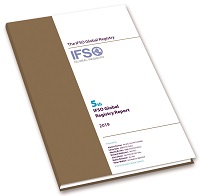 The Fifth IFSO Global Registry Report (2019) has been released at the XXIV World Congress of the International Federation for the Surgery of Obesity and Metabolic Disorders (IFSO) in Madrid, Spain. Published by Dendrite Clinical Systems, under the auspices of the IFSO, the publication reports data from more than 60 countries on over 833,000 operations including baseline obesity-related disease, operation types, operative outcomes and disease status after bariatric surgery.
The Fifth IFSO Global Registry Report (2019) has been released at the XXIV World Congress of the International Federation for the Surgery of Obesity and Metabolic Disorders (IFSO) in Madrid, Spain. Published by Dendrite Clinical Systems, under the auspices of the IFSO, the publication reports data from more than 60 countries on over 833,000 operations including baseline obesity-related disease, operation types, operative outcomes and disease status after bariatric surgery.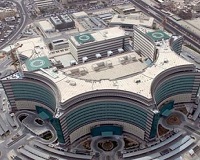 Dendrite Clinical Systems has announced the installation of its National Bariatric Surgical Registry software at the Sheik Al Jaber Al Sabah Hospital, in Kuwait. The Sheik Al Jaber Al Sabah Hospital, opened by His Highness the Amir Sheikh Sabah Al-Ahmad Al- Jaber Al-Sabah in November 2018, consists of five towering 10-stories structures built on a 220,000 square meters and has a hospital bed capacity of around 1,160 with 36 operation rooms, a medical centre, a helipad and a parking lot accommodating some 5,000 vehicles.
Dendrite Clinical Systems has announced the installation of its National Bariatric Surgical Registry software at the Sheik Al Jaber Al Sabah Hospital, in Kuwait. The Sheik Al Jaber Al Sabah Hospital, opened by His Highness the Amir Sheikh Sabah Al-Ahmad Al- Jaber Al-Sabah in November 2018, consists of five towering 10-stories structures built on a 220,000 square meters and has a hospital bed capacity of around 1,160 with 36 operation rooms, a medical centre, a helipad and a parking lot accommodating some 5,000 vehicles.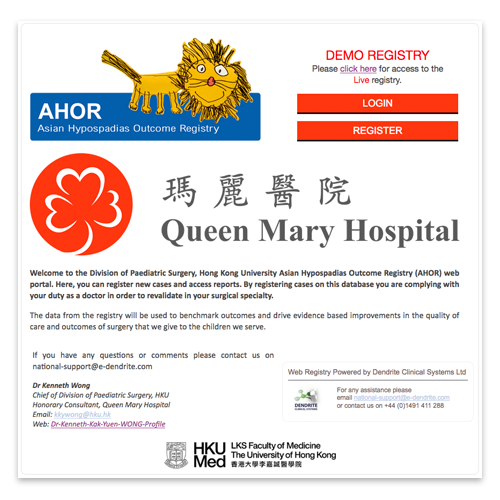 Dendrite Clinical Systems and the Queen Mary Hospital in Hong Kong have launched the Asian Hypospadias Outcome Registry (AHOR), is a prospective web-based patient registry that will collect, record and analyse the treatment and outcomes of patients undergoing surgical repair.
Dendrite Clinical Systems and the Queen Mary Hospital in Hong Kong have launched the Asian Hypospadias Outcome Registry (AHOR), is a prospective web-based patient registry that will collect, record and analyse the treatment and outcomes of patients undergoing surgical repair. Dendrite Clinical Systems has launched its ‘One-button push’ outcomes module, allowing clinicians to instantly produce their outcomes with the push of a single button. This enhancement is the latest in a series of advances incorporated into the company’s clinical registry software.
Dendrite Clinical Systems has launched its ‘One-button push’ outcomes module, allowing clinicians to instantly produce their outcomes with the push of a single button. This enhancement is the latest in a series of advances incorporated into the company’s clinical registry software.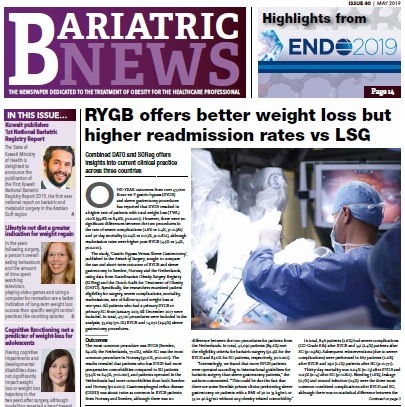 Dendrite Clinical Systems, the publisher of Bariatric News, is pleased to announce issue 40 of the newspaper is now available to view/download. The newspaper reports on research, technology, events and policy in the bariatric specialty, the latest clinical studies, policy changes and product news, the latest meetings and events, interviews prominent bariatric experts, and host debates between specialists on controversial topics.
Dendrite Clinical Systems, the publisher of Bariatric News, is pleased to announce issue 40 of the newspaper is now available to view/download. The newspaper reports on research, technology, events and policy in the bariatric specialty, the latest clinical studies, policy changes and product news, the latest meetings and events, interviews prominent bariatric experts, and host debates between specialists on controversial topics. Dendrite Clinical Systems – in collaboration with Haemotology Cancer Care (UCLH Charity), the Royal Free Charity, HaemSTAR (an organisation researching non-malignant haematology) and MPN Voice – have launched the MASCOT (Myeloproliferative Neoplasm Splanchnic Vein Thrombosis, MPN-SVT) Registry, a UK wide registry for patients with myeloproliferative diseases suffering from splanchnic or abdominal vein thrombosis.
Dendrite Clinical Systems – in collaboration with Haemotology Cancer Care (UCLH Charity), the Royal Free Charity, HaemSTAR (an organisation researching non-malignant haematology) and MPN Voice – have launched the MASCOT (Myeloproliferative Neoplasm Splanchnic Vein Thrombosis, MPN-SVT) Registry, a UK wide registry for patients with myeloproliferative diseases suffering from splanchnic or abdominal vein thrombosis.


